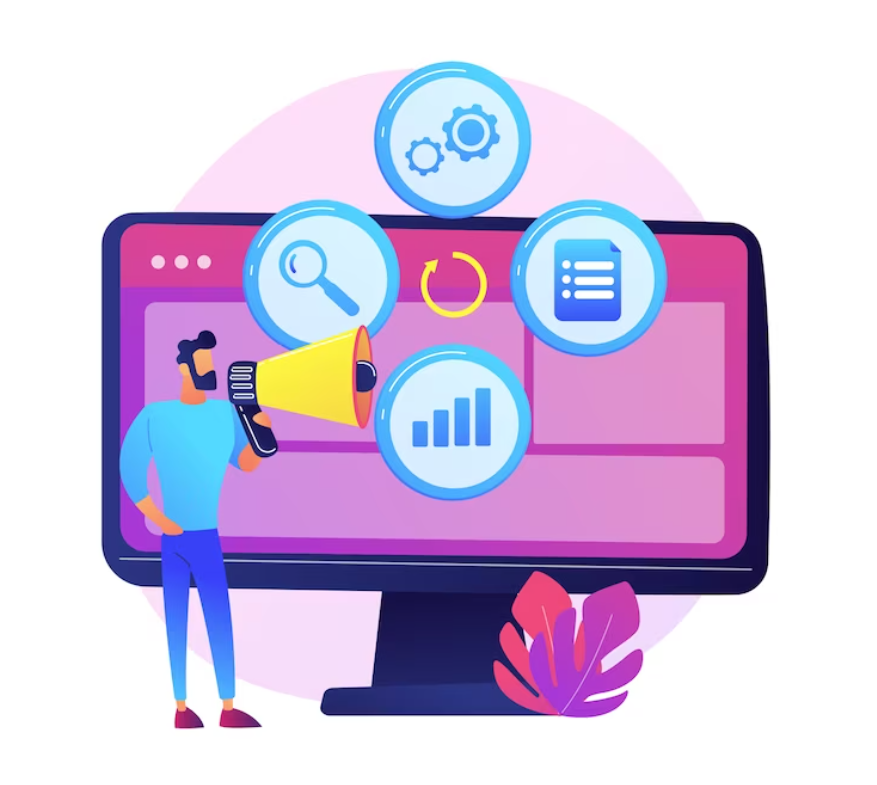Digital Marketing Overview: Types, Challenges, and Required Skills
In today’s digital age, businesses have a wide array of marketing channels at their disposal to reach and engage with their target audience. From social media to search engines, digital marketing has become an essential tool for businesses of all sizes. In this article, we will explore the different types of digital marketing, the challenges that come with it, and the skills required to succeed in this ever-evolving field.
What Is Digital Marketing?
Digital marketing refers to the use of digital channels to market products and services to consumers. This type of marketing involves the utilization of websites, mobile devices, social media, search engines, and other similar channels. Unlike traditional marketing, which relies on physical mediums such as print ads or billboards, digital marketing leverages technology to reach a wider audience.
Digital marketing encompasses a wide range of strategies and tactics, including content marketing, search engine optimization (SEO), social media marketing, email marketing, and more. It allows businesses to connect with their target audience in a more personalized and targeted manner, driving engagement, brand awareness, and ultimately, conversions.

How It Works
Digital marketing works by utilizing various channels to attract, engage, and convert customers. It involves understanding the target audience, creating compelling content, optimizing for search engines, and leveraging social media platforms. Let’s explore the key components of digital marketing:
Sources and Receivers
In digital marketing, businesses act as sources, creating and disseminating content across various channels. The target audience, or receivers, consume this content and engage with the brand. The goal is to build a relationship with the audience, establish trust, and ultimately convert them into customers.
Types of Digital Marketing Channels
Digital marketing encompasses a wide range of channels, each with its own unique characteristics and advantages. Let’s explore some of the most popular types of digital marketing channels:
Content Marketing
Content marketing involves creating and distributing valuable, relevant, and consistent content to attract and engage a target audience. This can include blog articles, videos, infographics, podcasts, and more. The goal is to provide value to the audience, establish thought leadership, and drive brand awareness.
Content marketing is a crucial component of digital marketing, as it fuels other strategies such as SEO, social media marketing, and email marketing. By creating high-quality content that resonates with the target audience, businesses can increase their online visibility and attract organic traffic.
Search Engine Marketing
Search engine marketing (SEM) encompasses both search engine optimization (SEO) and pay-per-click (PPC) advertising. SEO involves optimizing websites and content to rank higher in search engine results pages (SERPs) organically. This involves keyword research, on-page optimization, link building, and other strategies to improve visibility.
On the other hand, PPC advertising allows businesses to bid on keywords and display their ads at the top of search results. With PPC, businesses only pay when someone clicks on their ad. This strategy can be highly effective for driving targeted traffic and generating leads, especially for businesses in competitive industries.
Display Advertising
Display advertising involves placing visual ads on websites, mobile apps, and other digital platforms. These ads can take the form of banners, pop-ups, or videos. Display advertising allows businesses to target specific demographics, interests, or behaviors, making it a highly efficient way to reach a specific audience.
Programmatic advertising has revolutionized display advertising by automating the buying and selling of ad inventory. This technology uses algorithms to analyze user data and deliver ads to the most relevant audience segments. Retargeting is another powerful technique in display advertising, allowing businesses to show ads to users who have previously interacted with their brand.
Mobile Marketing
With the proliferation of smartphones and mobile apps, mobile marketing has become an essential component of digital marketing. Mobile marketing involves optimizing websites, ads, and content for mobile devices, as well as utilizing mobile-specific marketing tactics such as in-app advertising, SMS marketing, and push notifications.
Given the amount of time people spend on their phones, mobile marketing offers a unique opportunity to engage with customers in a personalized and timely manner. Businesses can leverage mobile apps and mobile-friendly websites to provide a seamless user experience and drive conversions.
Social Media Marketing
Social media marketing involves leveraging social media platforms such as Facebook, Instagram, Twitter, LinkedIn, and TikTok to promote products and services, engage with the target audience, and build brand awareness. Social media platforms provide businesses with a direct line of communication with their customers, allowing them to respond to feedback, resolve issues, and cultivate brand loyalty.
Social media marketing includes various tactics such as organic posting, paid advertising, influencer collaborations, and social media contests. By creating and sharing compelling content, businesses can increase their reach, drive website traffic, and generate leads.
Email Marketing
Email marketing is one of the oldest and most effective types of digital marketing. It involves sending targeted emails to a list of subscribers who have opted in to receive updates and promotions from the business. Email marketing allows businesses to nurture leads, build customer relationships, and drive conversions.
Effective email marketing involves understanding the target audience, segmenting the email list, and crafting personalized, relevant content. Businesses can use email marketing to send newsletters, product updates, promotional offers, and more. By leveraging automation and analytics, businesses can optimize their email campaigns for maximum effectiveness.
Influencer Marketing
Influencer marketing involves collaborating with influential individuals in a particular niche to promote products or services. Influencers, who have a large and engaged following on social media, can help businesses reach a wider audience and build brand credibility.
Influencer marketing can take various forms, such as sponsored posts, product reviews, and brand collaborations. Businesses need to identify relevant influencers who align with their brand values and target audience. By leveraging the influence and reach of these individuals, businesses can increase brand awareness and drive conversions.
Affiliate Marketing
Affiliate marketing involves partnering with affiliates who promote a business’s products or services in exchange for a commission. Affiliates can be individuals or other businesses that have a relevant audience and are willing to promote the business’s offerings.
Affiliate marketing is a performance-based strategy, as affiliates only earn a commission when their referral leads to a sale or conversion. This makes it a cost-effective way for businesses to expand their reach and drive revenue. Affiliate marketing can be particularly effective for e-commerce businesses or businesses with digital products.
Video Marketing
Video marketing involves creating and sharing videos to promote products, educate the audience, and engage with customers. Videos can take various forms, such as product demos, tutorials, testimonials, and brand stories. Video marketing allows businesses to convey their message in a visually compelling and engaging format.
With the rise of video-sharing platforms such as YouTube and TikTok, video marketing has become more accessible and effective. Businesses can leverage these platforms to reach a wider audience, drive engagement, and increase brand visibility. Additionally, live streaming has gained popularity, allowing businesses to interact with their audience in real-time.
Audio Marketing
Audio marketing involves utilizing audio content, such as podcasts, audiobooks, and voice assistants, to connect with the target audience. With the increasing popularity of podcasts and voice-activated devices like Amazon Echo and Google Home, audio marketing has become a valuable channel for businesses to reach and engage with their audience.
Businesses can create their own podcasts or collaborate with existing podcasters to share their expertise and promote their products or services. Voice search optimization is another important aspect of audio marketing, as businesses need to optimize their content to appear in voice search results.
Key Performance Indicators (KPIs) in Digital Marketing
Key performance indicators (KPIs) are measurable metrics that businesses use to gauge the success of their digital marketing efforts. KPIs vary depending on the specific goals and objectives of a business, but some common KPIs in digital marketing include:
- Website Traffic: The number of visitors to a website, which indicates the effectiveness of various marketing channels in driving traffic.
- Conversion Rate: The percentage of website visitors who complete a desired action, such as making a purchase or filling out a form.
- Click-Through Rate (CTR): The percentage of people who click on an ad or a link compared to the total number of impressions or views.
- Return on Investment (ROI): The ratio of the net profit generated by a digital marketing campaign to the cost of that campaign.
- Customer Lifetime Value (CLTV): The predicted net profit generated by a customer over their entire relationship with a business.
Tracking and analyzing these KPIs allows businesses to measure the success of their digital marketing campaigns, identify areas for improvement, and optimize their strategies to achieve their goals.

Digital Marketing Challenges
While digital marketing offers numerous opportunities for businesses, it also comes with its fair share of challenges. Some common challenges in digital marketing include:
- Competition: The digital landscape is highly competitive, with businesses vying for the attention of the same target audience. Standing out in a crowded market requires creativity, innovation, and a deep understanding of the target audience.
- Changing Algorithms: Search engines and social media platforms regularly update their algorithms, affecting how content is ranked and displayed. Staying up to date with these changes and adapting strategies accordingly is essential for maintaining visibility and engagement.
- Ad Fatigue: With the abundance of digital ads, consumers have become increasingly immune to traditional advertising techniques. Businesses need to find new and innovative ways to capture and maintain the attention of their target audience.
- Data Privacy and Security: As digital marketing relies on collecting and analyzing customer data, businesses need to ensure they comply with privacy regulations and protect customer information from data breaches.
- Measurement and Attribution: Determining the impact and ROI of digital marketing efforts can be challenging due to the complex customer journey and multiple touchpoints. Attribution models and tracking tools can help businesses gain insights into the effectiveness of their campaigns.
Addressing these challenges requires a combination of strategic thinking, data analysis, creativity, and adaptability. Businesses need to stay informed about the latest trends and best practices in digital marketing to stay ahead of the competition.

Implicit Bias in Digital Marketing
Despite the potential of digital marketing to reach a wide and diverse audience, it can also perpetuate implicit bias. Implicit bias refers to unconscious biases that affect decision-making and perception. In the context of digital marketing, implicit bias can manifest in various ways, such as:
- Targeting: Digital ads can be targeted based on demographic and behavioral data, which may inadvertently exclude or discriminate against certain groups.
- Algorithms: Machine learning algorithms used by search engines and social media platforms can reflect and amplify existing biases present in the data they are trained on.
- Representation: The lack of diversity in marketing campaigns and content can reinforce stereotypes and exclude underrepresented groups.
To address implicit bias in digital marketing, businesses need to be proactive in promoting diversity and inclusivity. This includes diversifying their marketing teams, challenging assumptions, and regularly reviewing and updating their targeting strategies to ensure they are inclusive and fair.
Frequently Asked Questions
Q: What is a digital marketing agency? A digital marketing agency is a company that specializes in providing digital marketing services to businesses. These agencies typically offer a range of services, including website design, SEO, PPC advertising, social media management, and content creation. Hiring a digital marketing agency can help businesses leverage the expertise and resources necessary to execute effective digital marketing campaigns.
Q: What skills are required for a career in digital marketing? A career in digital marketing requires a combination of technical and soft skills. Some essential skills for digital marketers include:
- Analytical Skills: The ability to analyze data, identify trends, and make data-driven decisions.
- Creativity: The ability to think creatively and come up with innovative marketing strategies and campaigns.
- Communication Skills: Strong written and verbal communication skills to effectively convey marketing messages and engage with the target audience.
- Technical Skills: Proficiency in digital marketing tools and platforms, such as Google Analytics, SEO tools, social media management tools, and email marketing software.
- Adaptability: The ability to adapt to new technologies, trends, and changes in the digital marketing landscape.
- Strategic Thinking: The ability to develop and execute comprehensive digital marketing strategies aligned with business goals.
- Collaboration: The ability to work effectively with cross-functional teams, including designers, developers, and copywriters.
Q: How can businesses measure the success of their digital marketing campaigns? Businesses can measure the success of their digital marketing campaigns by tracking key performance indicators (KPIs) and setting specific goals. Some common metrics to measure include website traffic, conversion rate, click-through rate, return on investment, and customer lifetime value. By regularly analyzing these metrics and making data-driven decisions, businesses can optimize their digital marketing strategies and achieve their objectives.
The Bottom Line
Digital marketing offers businesses a multitude of opportunities to connect with their target audience, build brand awareness, and drive conversions. By understanding the different types of digital marketing channels, the challenges involved, and the required skills, businesses can develop effective strategies to thrive in the digital landscape. With the right approach, businesses can leverage digital marketing to achieve their goals and stay ahead of the competition in today’s digital age.


